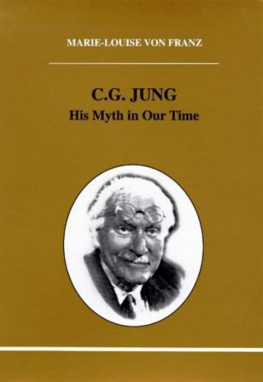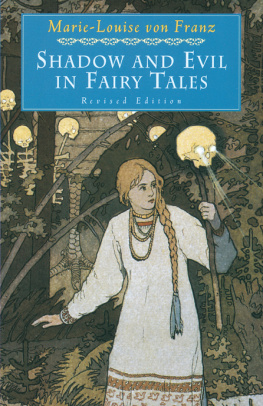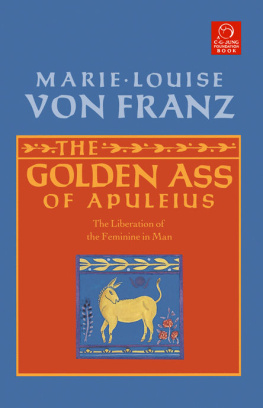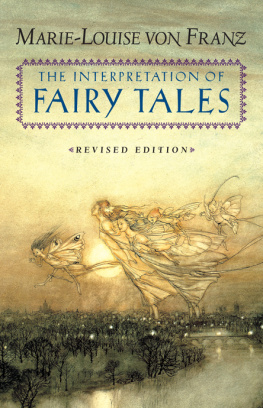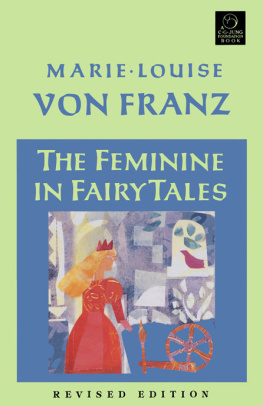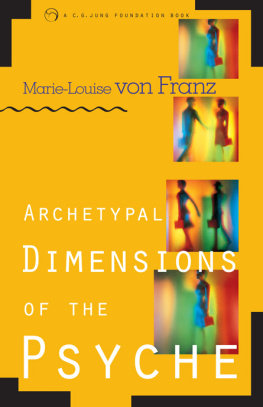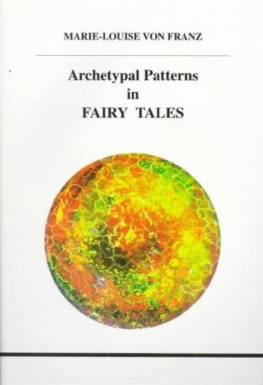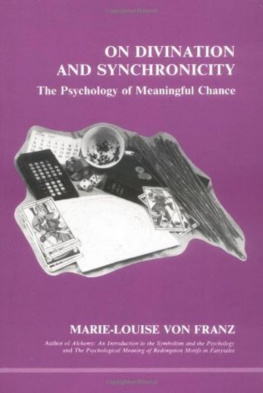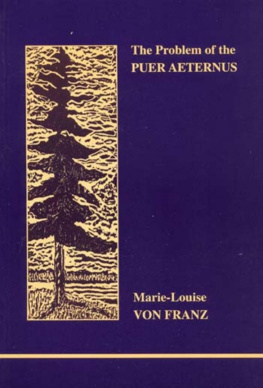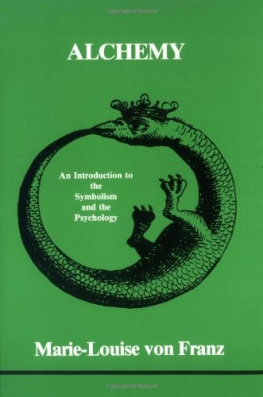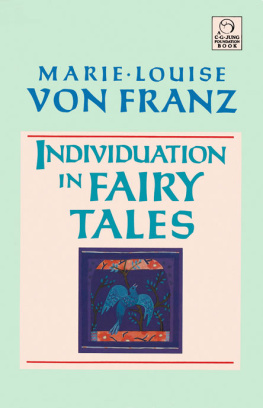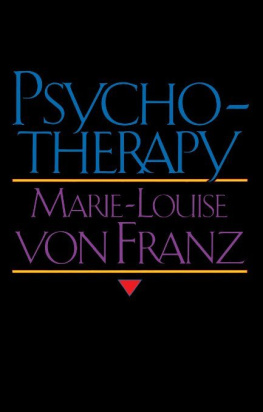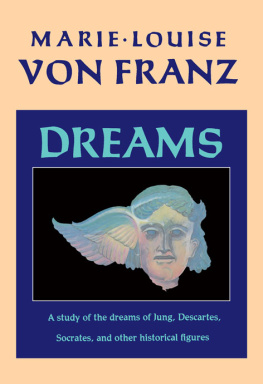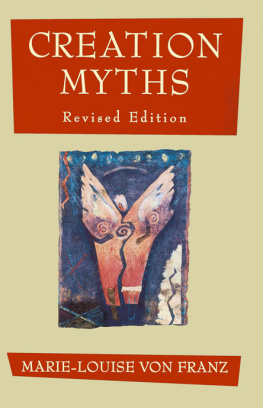Marie-Louise von Franz - C.G. Jung: His Myth in Our Time
Here you can read online Marie-Louise von Franz - C.G. Jung: His Myth in Our Time full text of the book (entire story) in english for free. Download pdf and epub, get meaning, cover and reviews about this ebook. year: 1971, publisher: Inner City Books, genre: Science. Description of the work, (preface) as well as reviews are available. Best literature library LitArk.com created for fans of good reading and offers a wide selection of genres:
Romance novel
Science fiction
Adventure
Detective
Science
History
Home and family
Prose
Art
Politics
Computer
Non-fiction
Religion
Business
Children
Humor
Choose a favorite category and find really read worthwhile books. Enjoy immersion in the world of imagination, feel the emotions of the characters or learn something new for yourself, make an fascinating discovery.
- Book:C.G. Jung: His Myth in Our Time
- Author:
- Publisher:Inner City Books
- Genre:
- Year:1971
- Rating:5 / 5
- Favourites:Add to favourites
- Your mark:
- 100
- 1
- 2
- 3
- 4
- 5
C.G. Jung: His Myth in Our Time: summary, description and annotation
We offer to read an annotation, description, summary or preface (depends on what the author of the book "C.G. Jung: His Myth in Our Time" wrote himself). If you haven't found the necessary information about the book — write in the comments, we will try to find it.
Marie-Louise von Franz: author's other books
Who wrote C.G. Jung: His Myth in Our Time? Find out the surname, the name of the author of the book and a list of all author's works by series.
C.G. Jung: His Myth in Our Time — read online for free the complete book (whole text) full work
Below is the text of the book, divided by pages. System saving the place of the last page read, allows you to conveniently read the book "C.G. Jung: His Myth in Our Time" online for free, without having to search again every time where you left off. Put a bookmark, and you can go to the page where you finished reading at any time.
Font size:
Interval:
Bookmark:
For permission to quote from the Collected Works of C. G. Jung, Jung's Letters, edited by Gerhard Adler in collaboration with Aniela Jaff, and Mircea Eliade's Shamanism, acknowledgment is made to Princeton University Press, publishers of these works in Bollingen Series in the United States, and to Routledge & Kegan Paul, publishers in the United Kingdom. For permission to quote from Memories, Dreams, Reflections by C. G. Jung, recorded and edited by Aniela Jaff, acknowledgment is made to Pantheon Books, Inc., a division of Random House, New York, and Collins and Routledge & Kegan Paul, London. (As these editions have different pagination, both are cited. See Introduction, n. 4.)
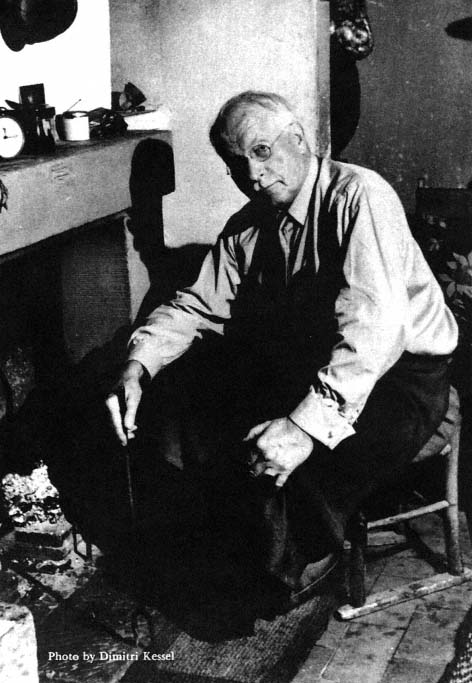
1875
July 26: Carl Gustav Jung born in Kesswil (Canton Thurgau), Switzerland, to Pastor Johann Paul Achilles Jung (1842-1896) and Emilie, ne Preiswerk (1848-1923).
1876
Six months after his birth, the family moves to Laufen, near the Falls of the Rhine.
1879
Family moves to Klein-Hningen, near Basel.
1884
Birth of sister, Gertrud (d. 1935). Jung enters the Gymnasium at Basel.
1895-1900
Studies natural science, then medicine, in the University of Basel.
1898
Begins preliminary studies for his dissertation.
1900
Completes state examinations in medicine. December 10: Assumes position as assistant to Eugen Bleuler at Burghlzli Mental Hospital (Psychiatric Clinic of the University of Zurich).
1903
Married to Emma Rauschenbach (1882-1955), daughter of a Schaffhausen industrialist. There were five children: Agathe (Niehus), Gret (Baumann), Franz, Marianne (Niehus), and Helene (Hoerni).
1905
Qualifies as lecturer in psychiatry on the medical faculty of the University of Zurich; becomes senior staff physician at the Burghlzli; continues as lecturer until 1913.
1906Defends Sigmund Freud at a congress in Baden-Baden, without having yet met him personally.
1907
March: First meeting with Freud, in Vienna.
1909
Invitation from Clark University, Worcester, Mass., to lecture on his word-association studies; travels with Freud, who lectures there on his work.
1910
Establishment of the International Psychoanalytic Association; Jung is first president, 1910-1914.
1911-1914
Gradual break with Freud.
1914
Journey to Italy (Ravenna).
1914
July: Lecture before the British Medical Association in Aberdeen, Scotland.
1914-1918
Confrontation with his own unconscious and with his "myth."
1916
Lecture on "The Structure of the Unconscious." Founding of the Psychology Club in Zurich.
1918-1919
Stationed, with the rank of Captain, as Commandant de la Rgion des Interns de Guerre, at Chteau d'Oex (Canton Vaud). Mandala studies.
1918-1926
Study of Gnosticism.
1920
Journey to Algeria and Tunisia.
1923
Begins building his "Tower" in Bollingen (Canton St. Gallen).
1924-1925
Visit to the Pueblo Indians in New Mexico and Arizona.
1925-1926
Expedition to Kenya, British East Africa, especially to the Elgonyi on Mt. Elgon.
1932
Awarded Literature Prize of the City of Zurich.
1933
Became president of the International General Medical Society for Psychotherapy and editor of the Zentralblatt fr Psychotherapie und ihre Grenzgebiete; served until 1939.
1933
Lecturer at the Federal Institute of Technology (E.T.H.), in Zurich.
1933-1951
Participant in and lecturer at the Eranos Conferences in Ascona.
1934
Begins systematic research into alchemy.
1935
Honorary Professor, Federal Institute of Technology (E.T.H.), until his resignation in 1941.
1938
Journey to India, at the invitation of the British Government, on the occasion of the 25th anniversary of the Indian Science Congress; honorary doctorates from the Universities of Calcutta, Benares, and Allahabad. (Jung also received honorary doctorates from Clark University, Worcester, Mass., Fordham University, New York, Harvard University, Oxford University, the University of Geneva, and the Federal Institute of Technology, in Zurich. He was also an honorary fellow of the Royal Society of Medicine, London.)
1944
Professor of Medical Psychology, University of Basel. Resigns the same year because of illness.
1945
Chairman of the newly founded Schweizerischen Gesellschaft fr praktische Psychologie.
1948
Founding of the C. G. Jung Institute, Zurich.
1955
November 27: Death of Emma Jung.
1960
Awarded Honorary Freedom of the City of Ksnacht.
1961
June 6: Carl Gustav Jung dies in his home at Ksnacht. June 9: Funeral service and burial at Ksnacht.
To write about C. G. Jung's effect both in and on the culture of our day and to do justice to the subject is an uncommonly difficult assignment. As a rule, outstanding individuals are influential chiefly or exclusively in their own professional fields. In Jung's case, however, his original, creative discoveries and ideas had to do with the whole human being and have therefore awakened echoes in the most varied areas outside that of psychology: his concept of synchronicity, for example, in atomic physics and Sinology; his psychological interpretation of religious phenomena, in theology; his fundamental view of man, in anthropology and ethnology; his contributions to the study of occult phenomena, in parapsychology, to mention only a few instances. Because Jung's work encompasses so many varied fields of interest, his influence on our cultural life has made itself felt only gradually and, in my opinion, is still only in its beginnings. Today, interest in Jung is growing year by year, especially among the younger generation. Accordingly, the growth of his influence is still in its early stages; thirty years from now we will, in all probability, be able to discuss his work in very different terms than we do today. In other words, Jung was so far ahead of his time that people are only gradually beginning to catch up with his discoveries. There is also the fact that his perceptions and insights are never superficial, but are so astonishingly original that many people must overcome a certain fear of innovation before they are able to approach them with an open mind. Furthermore, his published works include an enormous amount of detailed material from many fields, and the reader must work through this wealth of information in order to be able to follow him. Jung once remarked that ''anything that is good is expensive. It takes time, it requires your patience and no end of it.''
Since this was the spirit in which he worked, it is not surprising that Jung's influence is slow in making itself felt. The reader must give close attention to his patient reflections, involving the painstaking elucidation of much factual material, in order to understand what Jung is aiming at.
In addition to the above considerations there is a further characteristic which distinguishes both Jung's personality and his work quite fundamentally from all other cultural achievements up to the present time. This lies in the fact that the unconscious was intensely constellated in him and so also constellates itself in his readers, for Jung was the first to discover the spontaneous creativity of the unconscious psyche and to follow it consciously.
Font size:
Interval:
Bookmark:
Similar books «C.G. Jung: His Myth in Our Time»
Look at similar books to C.G. Jung: His Myth in Our Time. We have selected literature similar in name and meaning in the hope of providing readers with more options to find new, interesting, not yet read works.
Discussion, reviews of the book C.G. Jung: His Myth in Our Time and just readers' own opinions. Leave your comments, write what you think about the work, its meaning or the main characters. Specify what exactly you liked and what you didn't like, and why you think so.

